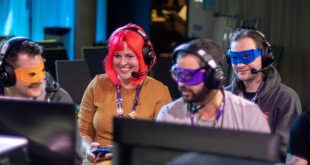Facebook Gaming’s Ciarán Norris explains why marketers need to catch up with the ever-evolving gaming audiences. This article was created in collaboration with Facebook Gaming.

Ciarán currently leads Facebook’s team focused on supporting PC & Console Gaming companies in EMEA.
Gaming audiences are evolving, so it’s more important than ever that marketers know who they’re speaking to, and what their message is.
There are countless clichés about the video game industry, and one of the most prevalent is the idea that there is such a thing as a typical gamer. If you ask someone to describe a ‘gamer’ they’ll most likely paint a stereotypical picture of a young male with a controller in his hands.
The true picture of a gamer is infinitely more diverse, as anyone who has had the pleasure of attending Gamescom in real life can attest. However, this isn’t necessarily reflected in the way games are marketed. This suggests some in the industry believe these clichés themselves, whether consciously or unconsciously.
Women in Gaming
Research by Newzoo shows that, contrary to popular perceptions (both inside and outside of the industry), 42% of console gamers are female. But when looking at the product, creative and targeting of many major console game marketing campaigns, it would be easy to think that only men are buying games.

In terms of product, it sometimes feels like one step forward and one step back. Analysis of the games showcased in press-conferences at E3 between 2015 and 2019 showed a disconnect in representation. The number of games with multiple character options had increased and the games which ‘centred’ males as the primary characters had gone down. However, the number of games showcased in 2019 which centred women was also lower than all bar one of the previous four years. One of the many sad things about E3 not taking place this year is that we will never know if that number would have gone up.
There are, however, positive signs. Games such as Wolfenstein: Youngblood and The Last of Us Part II showed us the cliche that gamers won’t play games built around female characters is a myth. More recently, Square Enix didn’t put Captain America, Iron Man or one of the obvious male characters at the heart of Marvel’s Avengers, but instead built the game around Ms Marvel, a Muslim Pakistanki-American woman, and the game was the best selling title in the UK at the time of writing this.
“It’s clear that many in the industry care passionately about building an environment that’s more welcoming to women, and about making games that better represent them”
One of the most anticipated games of the year, Cyberpunk 2077, will do away with binary gender choices entirely. As CD Projekt Red’s Senior Concept Artist Marthe Jonkers said: “You don’t choose your gender… you now choose a body type…and we have two voices, one that’s male sounding, one is female sounding. You can mix and match.”
These games are simply tapping into pent up demand within the gaming community, as our analysis of conversations around the last two E3s showed. At E3 2018, women represented 39 per cent of the conversations taking place on Facebook on the first morning of the event but in the run up to E3 2019, they made up 41 per cent of the conversation.
The ads that are being shown to these existing and potential customers also often reinforce the stereotype of games designed primarily for men, but evidence from similar industries shows that needn’t be the case. When looking to acquire new audiences, the entertainment industry often relies on a convergent personalization strategy. This can often lead to unconscious bias in the advertising (for example, action is for men, romance for women).
When working with the BBC on the launch of the first female Dr Who, we wanted to establish deeper, unbiased connections with the intended new audiences at each opportunity. We did this by leveraging machine learning and real people feedback in the development of new trailers, to minimize assumptions, increase relevance and, ultimately, drive business results; for that particular campaign, a 36 point lift in ad recall amongst females.
Make 2021 the year of diversity
It’s clear that many in the industry care passionately about building an environment that’s more welcoming to women, and about making games that better represent them. We’re very proud to be one of the five founding Pledge Partners for UKIE’s #RaiseTheGame Diversity Pledge but even happier there are now more than 60 other companies associated with the gaming that have signed up. If yours isn’t one of them, now is the time to do so.
2021 promises to be an incredible year for the games industry. It will start with two new consoles and continuing potential for VR and cloud gaming, all of which could broaden PC and console gaming audiences even further beyond the outdated cliches of young men.
It’s also an opportunity to refresh marketing strategies and media plans to fully embrace the diversity of gamers. Because if they aren’t in line with the people the games industry doesn’t currently reach, they risk missing the chance to bring a new generation of players into the next generation of gaming.

 MCV/DEVELOP News, events, research and jobs from the games industry
MCV/DEVELOP News, events, research and jobs from the games industry




